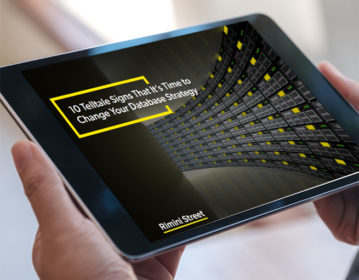
10 Telltale Signs That It’s Time to Change Your Database Strategy
The advent of databases in the 1980s represented a phenomenal breakthrough for business. Companies around the world capitalized on relational databases to run smarter, faster and more profitably. Today, Oracle, IBM, Microsoft and SAP are at the heart of almost every Fortune 500 and Global 2000 company, including yours. Instead of continuing to make massive investments in a database that already works, maybe it’s time to rethink your strategy.
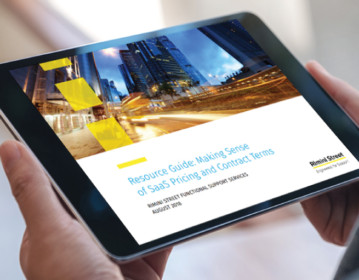
Making Sense of SaaS Pricing and Contract Terms
The rise in popularity of the software-as-a-service (SaaS) delivery model has resulted in numerous assumptions about this delivery platform. However, it has been difficult for many companies to separate fact from fiction. As a result, there’s legitimate concern that some companies are deploying SaaS solutions based on false assumptions. This eBook serves a primer for corporate IT buyers. It can be used to make sense of the SaaS messaging communicated by software vendors in general and SAP in particular. The eBook provides insight into true SaaS, thus enabling buyers to examine whether SaaS will truly be associated with lower total cost of ownership for an application. Generally, it can be said that there is significant confusion around SaaS, especially in relation to pricing and contract terms
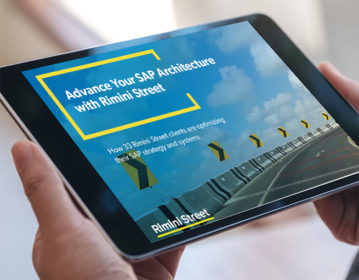
Advance Your SAP Architecture with Rimini Street
Despite SAP’s push to move licensees to S/4HANA, many organizations don’t have a compelling business for a costly, disruptive migration to S/4HANA. After evaluating its maturity, cost, and limited ROI, some SAP licensees haven chosen to defer making an S/4HANA decision. While others are saying “no” to S/4HANA to evaluate other modern cloud applications. And many SAP licensees are planning their S/4HANA journey or already running an S/4HANA implementation now. Regardless of the path you choose, Rimini Street can help you define your SAP strategy before, during, and after implementation of S/4HANA. This e-book highlights dozens of examples of how organizations like yours partner with Rimini Street to optimize their current and future ERP roadmaps – with or without S/4HANA.
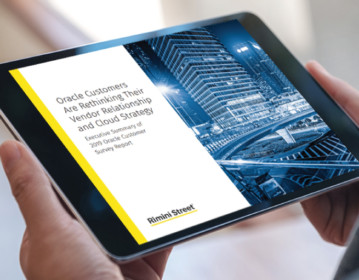
Oracle Customers Are Rethinking Their Vendor Relationship and Cloud Strategy
Oracle customers are faced with tough decisions on how to spend their time and resources. Views on what path to take often depend on roles within the company. Executives want to focus on driving the innovation that will help their companies grow and compete, but IT teams find themselves unable to take that route, as they are mired in maintenance and support issues. This executive summary, derived from the 2019 Oracle Applications Survey examines Oracle customer plans for their current ERP systems and looks at other issues that are top of mind for them.
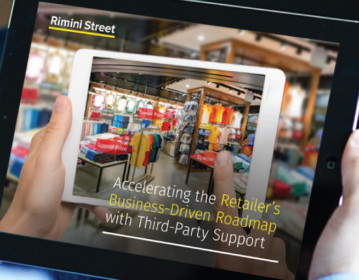
Accelerating the Retailer’s Business-Driven Roadmap with Third-Party Support
Retail is immensely competitive. And margins are tight. Those are givens. To gain an advantage, retailers must make digital transformation a priority. But with 80 to 90 percent of a typical IT budget committed to operating existing systems, where will the IT innovation funding come from? Retailers who are early adopters of third-party enterprise software support have unlocked innovation funding by freeing up their precious resources: avoiding unnecessary ERP vendor upgrades, and letting overpriced vendor maintenance contracts expire. These retailers also follow a Business-Driven Roadmap that aligns all IT spending with business priorities, not vendor priorities. Taking these strategic, fundamental savings steps unshackles valuable IT resources-both budget and staff-for more critical initiatives such as: improving loyalty programs and delivery systems, enhancing customer service through artificial intelligence, integrating mobile technologies into the shopping experience, and even trying out robots in the warehouse. Download this eBook for helpful insights on how third-party support and a Business-Driven IT Roadmap can help you regain your retail competitive advantage.
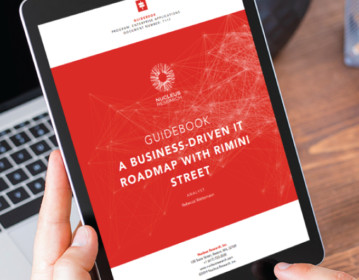
Nucleus Report: A Business-Driven IT Roadmap with Rimini Street
Many organizations follow an ERP vendor-dictated IT roadmap — implementing patches, upgrades, and transitions to the cloud as their vendors recommend — usually at a significant cost and sometimes with no business benefits at all. It’s a problem; fortunately there’s a solution. Nucleus Research, an independent IT research firm specializing in investigative research and ROI investment analysis, has authored this paper on embracing a Business-Driven IT Roadmap, citing Rimini Street as an enabler of a best-in-class, agile, transformative route. Switching from a vendor-dictated roadmap to a Business-Driven IT roadmap — where all IT spending and activities support the business goals of the organization — will enable you to: regain control of your IT strategy reduce vendor dependency and support costs maximize the value and extend the life of existing hardware and systems future-proof your application strategy increase staff productivity and retention free up funding for business-critical IT initiatives free up funding for innovation Discover the 5 key benefits of a Business-Driven Roadmap and how it can enable you to maintain control of your company’s IT direction — and drive IT success.
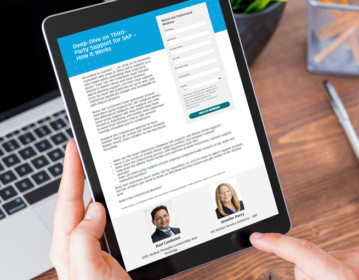
Deep-Dive on Third-Party Support for SAP – How it Works
According to Gartner1, “…an array of on-premises customers will move to third-party support as a safe haven while evaluating their long-term plans.” Over 500 SAP customers have already moved to Rimini Street and have received award-winning support, cut their total support costs for their SAP platforms by up to 90%, and redirected significant budget and bandwidth to high-impact projects. Many SAP customers have questions around how third-party support for SAP software works, key differences between SAP support and how third-party support will help them meet their technical, functional and service level objectives to keep their mission-critical SAP systems running smoothly and in compliance. Request this OnDemand webinar to hear Jennifer Perry, VP, Global SAP Service Delivery, Rimini Street, share answers to key questions including: What are the main differences between SAP support and Rimini Street support? What is the scope of Rimini Street support services and software covered? What does the onboarding process and experience look like? How does the Rimini Street model and expertise provide responsive, tailored support globally? How can third-party support ensure ongoing compliance with respect to tax, legal and regulatory updates? Most SAP customers must notify SAP by September 30, 2020 in order to switch support provider. Get the answers you need to make an informed decision before you get locked-in for another year. Watch the OnDemand webinar! 1Gartner, Predicts 2020: Negotiate Software and Cloud Contracts to Manage Marketplace Growth and Reduce Legacy Costs, 18 December 2019
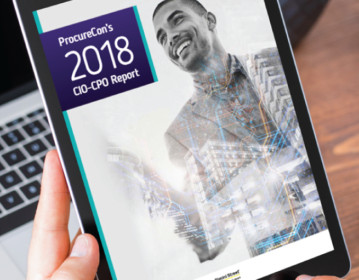
ProcureCon’s 2018 CIO-CPO Report
A recent survey by ProcureCon found “the state of collaboration between the CIO and CPO has continued to evolve in response to developing external pressure…today’s business conditions call for a strategic alliance between them.” That is easier said than done, especially when IT stakeholders may be reluctant to inspect pockets of spend that haven’t been touched for years. One such area is software vendor support. In our experience, most IT teams admit that the cost-to-value ratio of software vendor support is terrible, particularly when it comes to vendor support of ERP systems, but they don’t feel they have options. The responsibility falls on the shoulders of the CPO and their teams to ask the tough questions: Do we renew software maintenance contracts despite receiving what we feel is sub-par support or low-value updates from ERP vendors? Are we paying vendors each year without understanding the fully-loaded cost of software support and maintenance? Does our software support budget rob us of dollars we could apply to more strategic parts of our business? Do we make decisions based on fear of potential adverse responses or consequences from the vendor? If you answered “yes” to any of those, find out how GE Software and IT Sourcing Leader Aashish Talwar, and Head of Indirect Procurement for Ace Hardware, Fraz Baig build strategic alliances between the CPO and IT by asking the questions that may help to unlock funding to power their business-driven ERP roadmaps.


